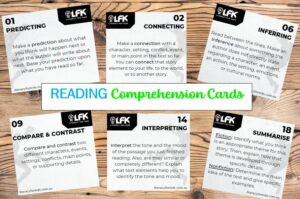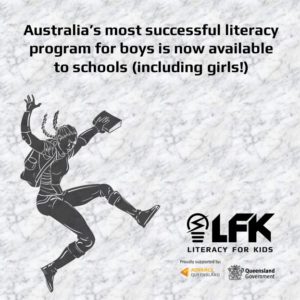Why adults need to read for pleasure

I advocate strongly about why it’s important that children read for pleasure, but we don’t seem to place that same importance on adults’ reading habits. So, is it important that adults read for enjoyment? And if so, how many adults actually read for pleasure on a regular basis?
Besides modelling reading for our children (this is so important!!), here’s some insights from Teacher Magazine on the importance of why adults need to read for enjoyment.
A study published in 2017 by the Australia Council for the Arts and Macquarie University found that 51 per cent of the 3000 participants in the sample were considered occasional readers (those who have read between one and 10 books in the last 12 months) and 41 per cent were considered frequent readers (more than 10 books).
“Australians read regularly and a lot of people read as many as 10 books in a year. With people living such busy lives, that really surprised me,” Dr Judith Seaboyer, a Senior Lecturer in Literary Studies at the University of Queensland, tells Wellbeing by Teacher.
The survey also shows that, on average, Australians spend about seven hours reading each week (including books, the internet and other media), of which about 70 per cent is reading for pleasure.
Participants in the survey were also asked about the types of books they enjoy reading. Among fiction books, almost half of respondents indicated crime, mystery or thrillers as a category they enjoyed reading, while the most frequently nominated non-fiction genre was autobiography, biography or memoirs.
“Research shows that Australians’ most preferred texts are mysteries and thrillers,” Seaboyer says. “There’s nothing wrong with that, except that you don’t need to be particularly engaged to read these types of texts.”
She says that Australian adults have become part of a speed-reading culture, which means fewer people are reading deeply and thoughtfully.
“How many of us read a novel to see how the plot sorts itself out and get to the end, and then put it back on the shelf or take it back to the library? The kinds of novels we mostly read for pleasure nowadays are escapist.”
The Skill of Deep Reading
Seaboyer says that unless the cognitive skills required for deep reading are developed and nurtured, new generations of readers may not learn to venture beyond the shallows of the reading experience.
Seaboyer adds that adult readers can be easily distracted by the availability of digital information, consuming media in short grabs as they click from page to page. Deep reading, in contrast, is a learned skill that requires the development of particular neural networks.
“What deep reading does for us is it helps us to keep those neural pathways working well and it helps us to keep learning more about the world. It keeps us open-minded, it makes us hospitable to other ideas and so on,” Seaboyer says.
“The more that we deep read, the more practise they do, the better we become at that kind of reading. But if we stop doing it and we stop maintaining those pathways, if we as adults cease to practise that long-form, immersive, engaged reading – we lose that skill.”
How can you embed reading into your busy routine?
If you’re a person that struggles to read long-form texts, it can be difficult to know how to begin embedding reading for enjoyment into your routine. Seaboyer says that while it is difficult, there are simple steps you can take to get started.
“I think you need to think of it as something that you do in your life that is important to make time for. So for somebody with three kids and a full-time job, that’s perhaps going to be at the weekend. Just set the time aside,” she says.
Seaboyer also recommends thinking of reading as a kind of hospitality. “Think to yourself, I’m the host and my book is my guest and I’m trying to understand that text, I’m trying to open myself up to that text and be prepared to hear what it has to say to me.”
By approaching the text in this way, she explains, you’ll be encouraged to engage in deep reading and to consider the text beyond the conceptual structures of the plot. “Any act of reading that goes beyond the conceptual structures can be seen as an opportunity to understand others, to open your trust to that and to accept the text for what it is.”
Our Summary
There are many distractions in our lives and they often prevent us from modeling good reading behaviours for our kids. Whether you’re the parent or caregiver of a newborn or a teenager, it’s so easy to become distracted by dings, vibrations, and alerts. Feel like you still don’t have the time to read? Here’s 4 reasons to convince you:
1) Reading fiction can help you be more open-minded and creative
2) People who read books live longer
(That’s according to researchers at Yale who studies 3 700 people older than 50 and found that those who read books for 30 minutes daily lived an average of 23 months longer than nonreaders or magazine readers.)
3) Reading 50 books a year is something you can actually accomplish
(Trade wasted time on your phone for flipping pages in bed, on trains, during meal breaks, and while waiting in line.)
4) Successful people are readers
(It’s because high achievers are keen on self-improvement.)
There’s no doubt about reading: it’s good for us. You might think you’ve heard it all: the mental health benefits, the learning benefits for kids, and even the stress relief aspects. But it can also make you more creative and empathetic, improve your memory, and become more open-minded.
Our literacy programs have created the reading content to support your teaching. STEM, history, creative writing, science: with hundreds of kid-centric topics to choose from, our programs have been proven to lift literacy in schools and at home. Contact us today.
Our Results
An effective reading program needs to be backed by strong results. Literacy for Boys was independently tested in one of the largest State Primary schools in Qld. Students in Years 3 to 6 improved their reading, spelling and comprehension ages by an average of 12 months after only 18 weeks on our program! Click here for the full report.
Contact us if you’d like to trial Literacy for Boys or Literacy for Kids in your school.
info@literacyforboys.com.au
info@literacyforkids.com.au
Want your students to finish strong in their literacy? Want more from your literacy program? Contact us for a 30-day free trial in your school or classroom. New schools receive these great ‘Turn and Talk’ comprehension cards for their classroom ~

Student Comprehension Cards
Check out our blogs for more ideas and tips.
5 Ways to Build Student Confidence
Identify Comprehension Gaps with these great cards
Steps to Successfully Support Disengaged Learners
See us featured in The Educator Australia magazine
Research confirms that early reading boosts literacy
Boys Love LFB – Here’s what they have to say!
Get boys reading in the digital age
Why write? Tips for reluctant writers
Brought to you by Tanya Grambower


